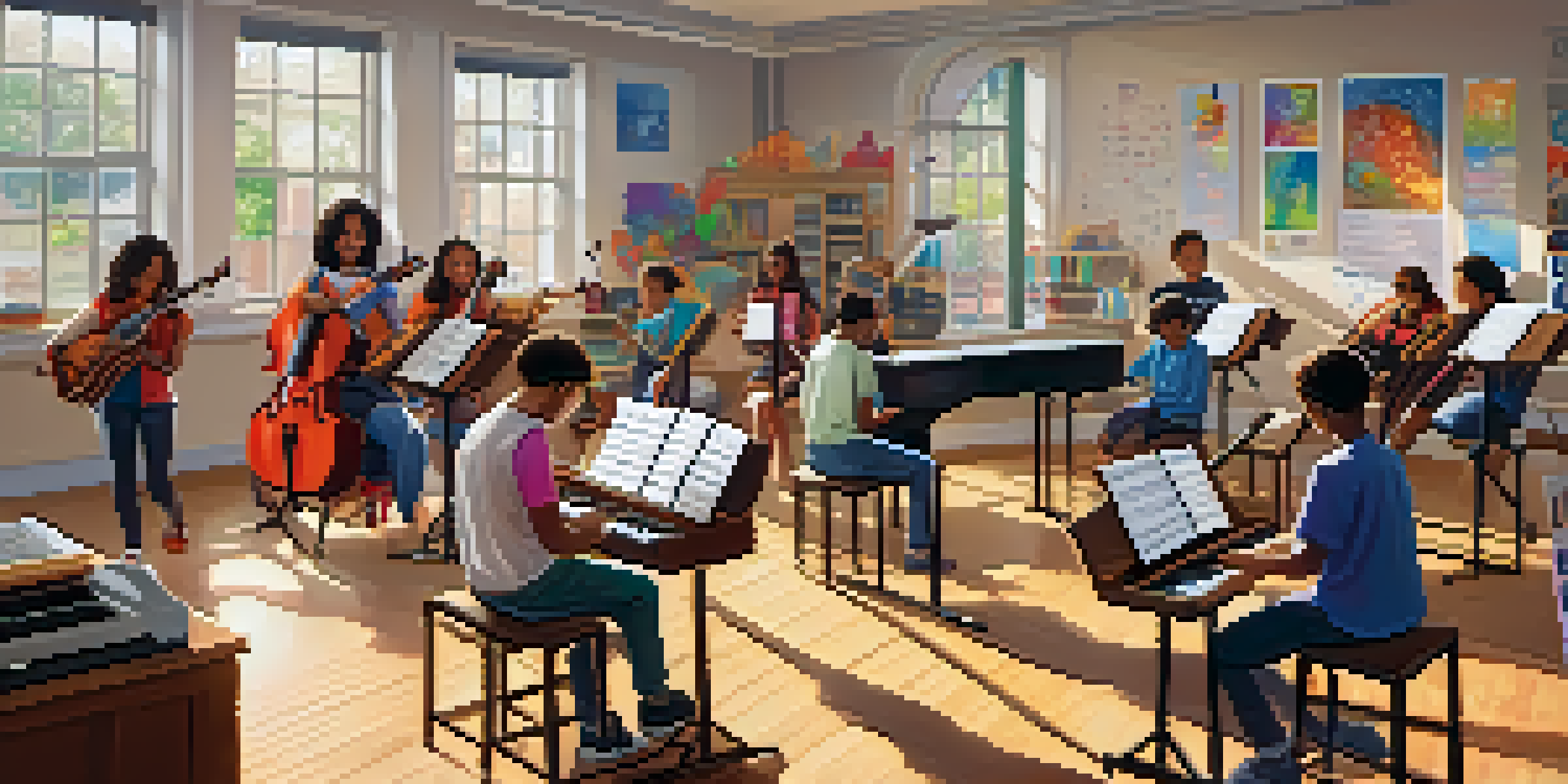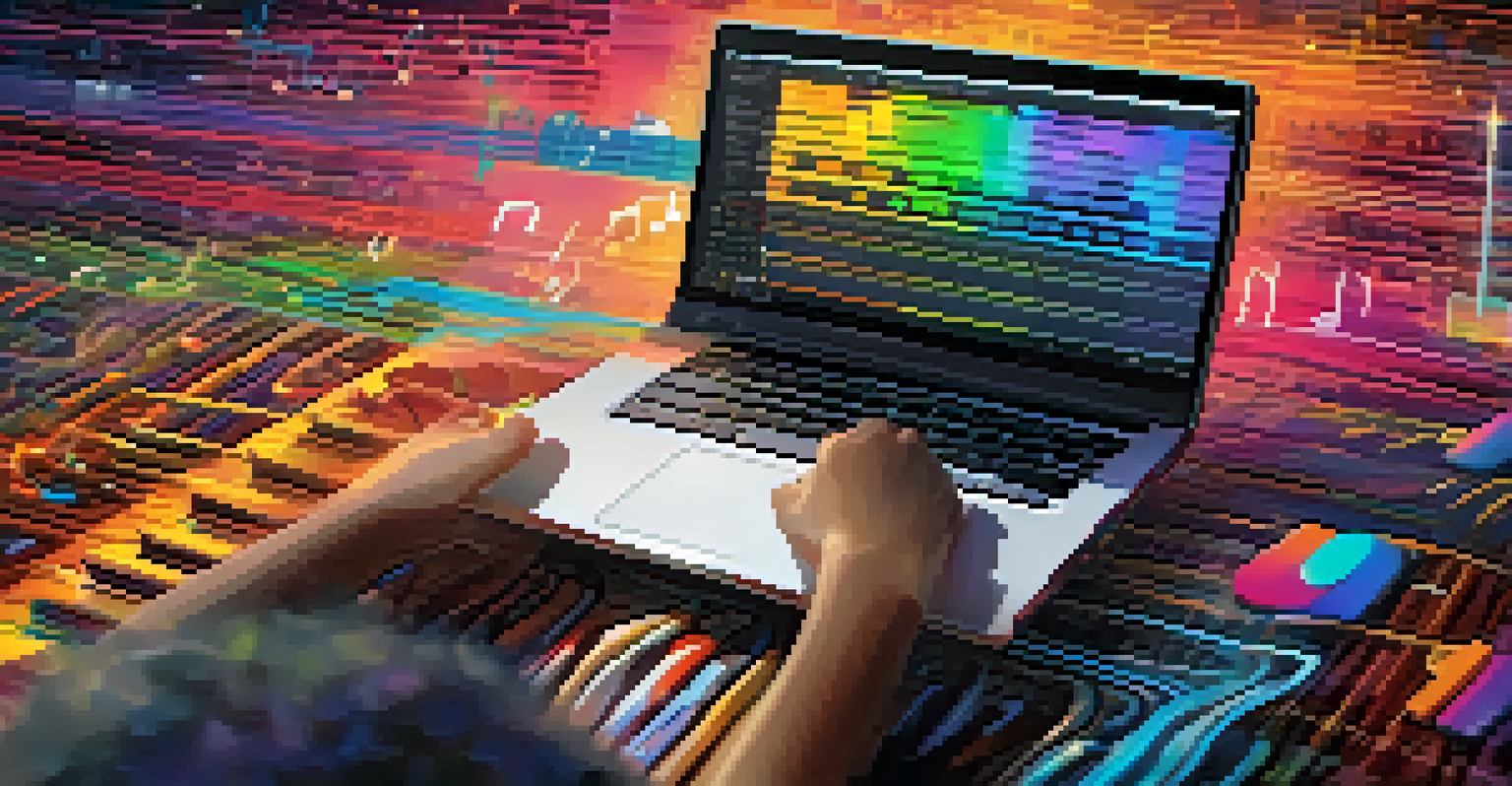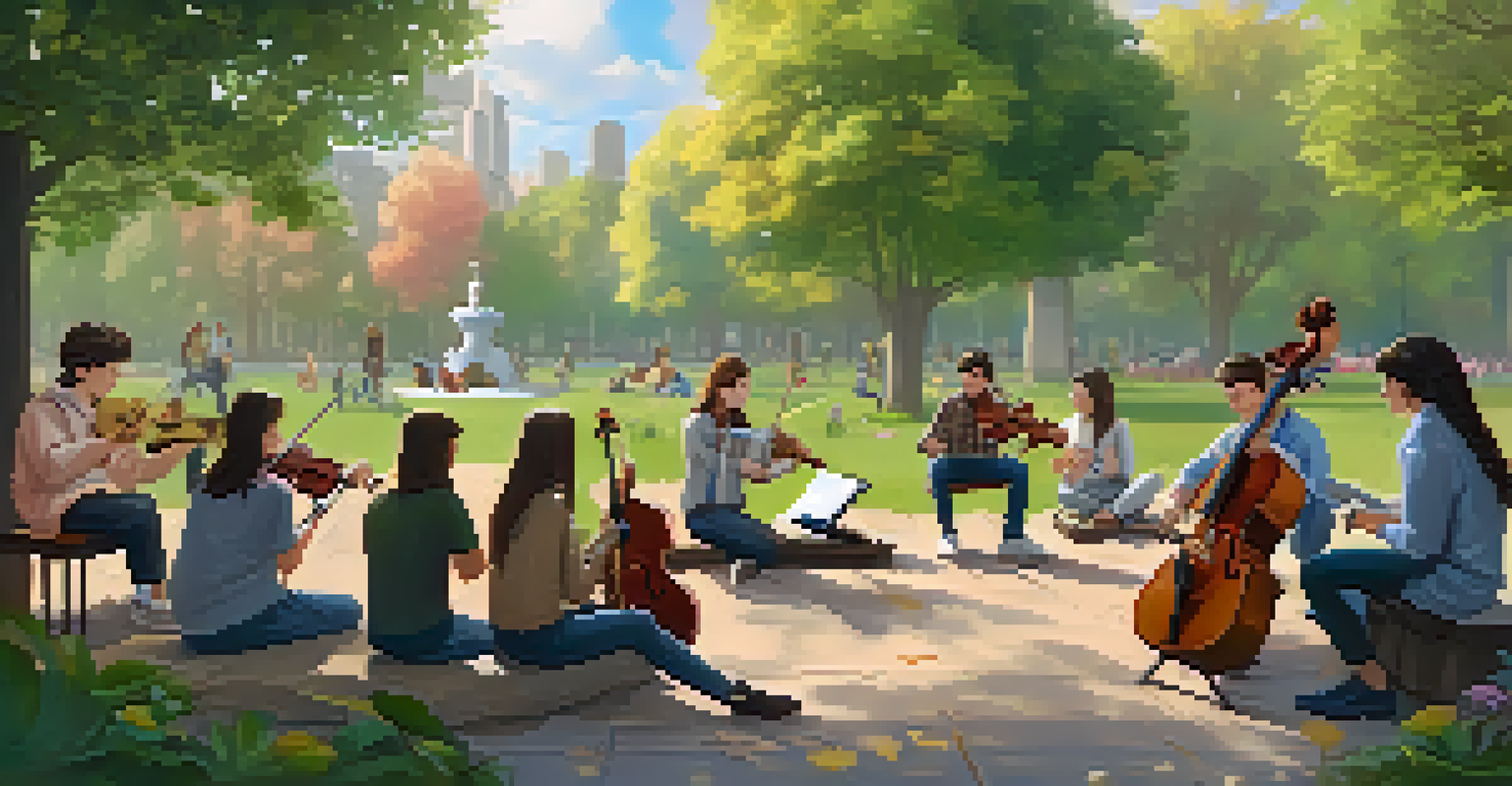AI in Music Education: Enhancing Learning Experiences

The Role of AI in Modern Music Education
Artificial Intelligence (AI) is revolutionizing the way music is taught and learned. By leveraging technology, educators can now provide tailored experiences that cater to individual student needs. This shift not only enhances engagement but also fosters a deeper understanding of musical concepts. Imagine a classroom where every student receives personalized feedback based on their unique progress, thanks to AI.
Education is the most powerful weapon which you can use to change the world.
With tools that analyze student performances in real-time, AI can pinpoint areas for improvement, making practice more efficient and effective. For example, a student learning the piano can receive instant suggestions on finger positioning or rhythm accuracy. This immediate feedback loop empowers learners to correct mistakes on the spot, boosting their confidence and skill development.
Moreover, AI can help educators streamline lesson planning and resource allocation. By analyzing data from various students, teachers can identify common challenges and adjust their curricula accordingly. This data-driven approach ensures that every student receives the support they need, ultimately leading to a more inclusive and effective learning environment.
Personalized Learning Experiences Through AI
One of the most exciting aspects of AI in music education is its ability to create personalized learning paths. Every student has a unique musical journey, and AI can adapt to these individual styles, preferences, and learning speeds. For instance, platforms like SmartMusic or Yousician offer tailored exercises that adjust difficulty based on the student’s progress, keeping them engaged and motivated.

Imagine a beginner guitarist who struggles with a specific chord progression. An AI-powered app can analyze their playing and suggest targeted exercises to improve that particular skill. This personalized approach not only makes learning more enjoyable but also helps students to progress faster than traditional methods would allow.
AI Personalizes Music Learning
AI enables customized learning experiences that adapt to individual student needs, enhancing engagement and skill development.
Furthermore, personalized learning through AI fosters a sense of ownership over the learning process. Students are more likely to stay engaged when they feel their educational experience is designed just for them. This autonomy can lead to greater persistence in practice and a deeper connection to their musical pursuits.
AI-Powered Tools for Music Composition
AI is not just enhancing learning experiences; it’s also transforming the way music is composed. Tools like AIVA and Amper Music allow students to experiment with composition by generating original music based on their inputs. This hands-on experience encourages creativity, giving students the freedom to explore different musical styles and structures.
Music is the universal language of mankind.
Imagine a budding composer who can collaborate with an AI system to create a symphony. They can input their ideas, and the AI provides suggestions for melodies, harmonies, or rhythms, making the process collaborative and dynamic. This interaction not only enhances the creative process but also teaches students about music theory and composition techniques in a practical manner.
Moreover, these AI tools can serve as a bridge between traditional music education and contemporary practices. As students become familiar with technology-driven composition, they are better prepared for the evolving music industry, where understanding digital tools is crucial.
Enhancing Collaborative Learning with AI
Collaboration is a key element in music education, and AI is making it easier than ever. Platforms that utilize AI can facilitate virtual group practices, allowing students to play together regardless of their physical location. This fosters teamwork and communication skills, essential components of any successful musical endeavor.
Consider a scenario where students from different parts of the world can collaborate on a musical project through an AI platform. They can share their individual parts, receive AI-generated suggestions for harmonies, and even practice together in real-time. This global collaboration opens up new avenues for creativity and cultural exchange.
AI Enhances Collaboration
AI-powered platforms facilitate virtual group practices, allowing students from different locations to collaborate on musical projects.
Additionally, AI can help teachers monitor group dynamics and engagement levels during collaborative projects. By analyzing participation data, educators can identify students who may be struggling or disengaged, allowing them to intervene and provide support as needed. This ensures that every student feels included and valued in their collaborative learning experiences.
AI and Accessibility in Music Education
One of the most significant benefits of AI in music education is its potential to enhance accessibility for all students. With AI-driven tools, students with disabilities can engage with music in ways that were previously unimaginable. For example, adaptive technology can help visually impaired students read sheet music through audio descriptions or tactile feedback.
Imagine a student with hearing impairments using AI to visualize sound waves or vibrations, allowing them to experience music in a unique way. These innovations not only make music education more inclusive but also empower all students to explore and express themselves through music.
Furthermore, AI can assist educators in developing strategies to accommodate diverse learning needs. By analyzing student performance data, teachers can identify specific challenges faced by students with disabilities, allowing them to tailor their teaching methods effectively. This ensures that every student has the opportunity to succeed in their musical education.
The Future of Music Education with AI
As AI technology continues to evolve, its impact on music education will only grow. We can expect to see even more sophisticated tools that facilitate learning, composition, and collaboration. Imagine AI systems that can not only assist with practice but also predict student needs and suggest resources before they even recognize them themselves.
Moreover, the integration of AI in music education could lead to a fundamental shift in how music is taught and perceived. Traditional methods may evolve to embrace a more holistic approach, where technology and creativity go hand in hand. This evolution could inspire a new generation of musicians who are not only skilled performers but also savvy technologists.
AI Improves Accessibility
AI-driven tools enhance accessibility in music education, empowering students with disabilities to engage with music in innovative ways.
Ultimately, the future of music education with AI holds tremendous potential. By embracing these advancements, educators can create richer, more engaging learning experiences that prepare students for success in a rapidly changing world.
Challenges and Considerations in AI Music Education
While the benefits of AI in music education are clear, there are also challenges and considerations to keep in mind. One significant concern is the reliance on technology, which could potentially overshadow traditional teaching methods and human interaction. It's essential to strike a balance between using AI as a tool and maintaining the personal connection that is vital in music education.
Additionally, the accessibility of AI tools can be a hurdle. Not all schools have the resources to implement advanced technology, which could create disparities in learning opportunities. Ensuring that all students have access to AI-driven education is crucial for creating an equitable learning environment.

Lastly, as with any technology, there are ethical considerations surrounding AI in music. Issues related to copyright, ownership, and the authenticity of AI-generated music need to be addressed to ensure that the creative rights of individuals are respected. As we navigate these challenges, fostering an open dialogue between educators, technologists, and policymakers will be essential.